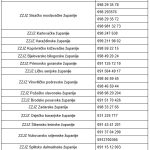As Novac/Filip Pavic writes on the 21st of April, 2020, more than 2.1 million Croats have now turned to online shopping during the coronavirus epidemic and have made it clear that they plan to continue to shop that way in the future. Of those, at least 130,000 people have not purchased online before, according to a study by Equestris.
In addition, according to Sandro Baricevic, Equestris’ director, a comparative analysis of respondents between the ages of 18 and 60 shows a 30 percent increase in online shopping habits in Croats over 50 years of age. This age group is one that, according to popular belief, is otherwise much less used to new technologies. All of this testifies to a dramatic change in consumer habits due to the inability to shop at physical stores owing to the coronavirus pandemic.
”There has certainly been a paradigm shift, as indicated by information that online purchases are now being made by people who have never done so before. Additionally, according to our data, 40,000 new users over the age of 50 have expressed their intention to shop online in the near future,” Baricevic pointed out.
Similar data comes from the Croatian market analysis firm Shopper’s Mind. According to them, almost 75 percent of adult Croats will regularly shop online in the coming months if current anti-epidemic measures are maintained. This was shown by the analysis based on the data of the Jeftinije.hr site, the largest Croatian comparative shopping portal.
This represents a significant jump, more than 80 percent when compared to last year, when only 45 percent of Croats regularly used online stores according to the European Commission (Digital Scoreboard).
”In the case of an extension of several months of the current situation, I’m convinced that we can expect a strong increase in online shopping from existing customers and the transition to new product groups that will be purchased online,” replied Darko Dujic, an online store specialist and the director of the aforementioned company Shopper’s Mind.
As for the products being purchased online, there has been a dramatic decline in everything that Croats typically ordered the most from their homes so far. For example, the number of orders for clothing, footwear and fashion accessories has halved, with interest in jewellery, watches and home appliances also falling significantly.
Food and grocery shopping, on the other hand, has seen excellent growth. According to an Equestris analysis, before March, 24 percent of Croats bought food and food products from local retail chains online. In March, that number jumped to 39 percent, and in the coming months, nearly 50 percent of Croats will buy groceries online. Cleaning and hygiene products also jumped from 37 percent up to 53 percent, and the purchase of pet food online increased by a quarter when compared to the pre-March period.
There is also increasing demand for devices such as webcams and laptops, as well as household and cleaning products, such as humidifiers and ionizers, coffee makers and bread makers, as well as gaming consoles, board games and toys for children.
Asked what this all means for the future of ”physical” stores, Darko Dujic of Shopper’s Mind replied that “a new reality could wipe out at least 10 percent of physical stores in different sectors.”
”If traditional channels once accounted for 95 percent of total traffic, we can suppose that 70 or 75 percent would work in this new reality. What does this mean for the ”productivity” of a square metre of sales space? Of course, that will be drastically reduced, which in turn means that there are numerous shops that will no longer be profitable, Dujic predicted.
Sandro Baricevic of Equestris will not completely agree with these estimates, and he believes that that there is no rivalry between physical and online stores.
”These meet different needs and situations for the consumer. The data shows that, if we compare online and physical shopping, 37 percent of respondents spend more when they physically make a purchase than they do online,” Baricevic argues that physical stores are, at least for the time being, more profitable for retailers because they encourage shoppers to impulsively shop as well as purchase what they came in for.
”eCommerce traffic in Croatia is growing at around 10 percent every year, reaching 449 million euros last year. However, our survey from half a year ago found that one fifth of internet users shop online, and this is not yet at the level of Western Europe or of the US. The coronavirus epidemic may reduce that resistance,” said Marcel Majsan, the president of eCommerce Croatia.
In addition, the responsibility lies with the dealers themselves. They should make it easier for customers to buy and return goods as easily as possible, thus building trust. Now is the time, noted Majsan, that traders who have not paid too much attention to offline synchronisation and online sales do so if they want to survive.
They can do this in a variety of ways. If a customer has a loyalty card that has been collecting points for years, the merchant should allow him to use it to purchase something online. For buyers who don’t know how to make a purchase online but would do it by phone or SMS, the merchant should make it easy for him to provide his information and send him the goods with the option of payment upon delivery.
The Croatian Chamber of Commerce (HGK) didn’t want to speculate on what changes the current coronavirus epidemic will bring about in the trade sector and whether or not there will be a major change in the “consumer paradigm”, but they believe that consumer habits will change somewhat – and forcibly so.
“The fact is that the average consumer today is informed, increasingly critical and increasingly digitised. Price is still one of the most important factors in making a decision on purchasing something and will remain so in the situation caused by the coronavirus epidemic. Time will tell, as will the length of the pandemic, which concrete changes await us in the changing of consumer behaviour habits,” the chamber stated.
They also pointed out that, in spite of expectations, the stabilisation of consumption is happening, which can partly be attributed to the growth of online commerce. According to their data, Croats spent 1.194 billion kuna over the Easter holidays, which is 14 percent less than they did in the same period last year, but this doesn’t include the results of the products OPGs have sold online.
”When we take into account that these figures don’t include the results of sales made by OPGs via online channels, which is something that has increased significantly in the last few weeks, we can say that we’re dealing with the coronavirus crisis quite solidly for the time being, that is, there’s been no drastic drop in consumption, which is something that we have all feared,” Ravlic explained.
According to a survey conducted by the Ja Trgovac magazine and the Hendal Agency, nearly two thirds of Croats intended to save before Easter, and most people planned to spend less than 500 kuna. According to the Tax Administration, a total of 976 million kuna was fiscalised in trade and 838.2 million kuna was fiscalised in retail trade (from Good Thursday to Easter Monday).
The strong and large companies found the ”online switch” the easiest, and the question is how, after the coronavirus epidemic ends, OPGs will manage to continue selling their products through Facebook.
In terms of merchant perspective, Marcel Majsan, the president of eCommerce Croatia, believes that an online sales channel doesn’t work for every merchant. He said that the transition of traffic from physical stores to the online sphere was much easier for large companies than it was for Croatia’s very many OPGs.
”Since the outbreak of the coronavirus epidemic, we’ve seen an increase in inquiries for ”quick fixes”, such as Facebook sales, most of the OPGs that have not sold their products online so far haven’t done so because they didn’t have the time or need to do so. Unfortunately, I don’t believe that such a way of selling will satisfy them in the long run because it doesn’t allow them to track inventories, build a customer base, send out customer order notifications, track shipping, or many other functionalities that customers just expect today,” explains Majsan.
Nevertheless, Equestris’ data on purchases from OPGs at the beginning of April shows that things are somewhat more optimistic. As many as 30 percent of Croats, at the height of isolation, ordered groceries from domestic OPGs online. At the same time, buyers weren’t guided by the speed of delivery, which is one of the more important criteria in “classic” online shopping, but mostly by the quality of the food (according to 78 percent of respondents) and price (according to 54 percent of respondents).
As for the products themselves, customers mostly ordered fresh vegetables, fresh fruits, eggs and dairy products.
Make sure to follow our dedicated section for all you need to know about coronavirus in relation to Croatia.










